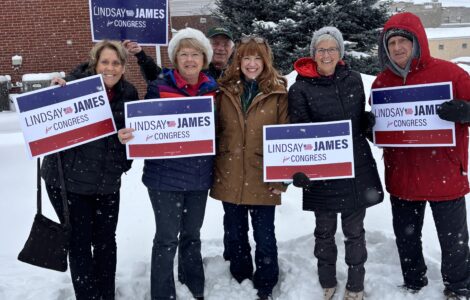Judge questions state’s probe of sexual harassment at Iowa Veterans Home
Supervisor was fired amid ‘vague allegations’ by the state, judge says

The courtyard at the Iowa Veterans Home in Marshalltown. PHOTO AND LOGO COURTESY OF STATE OF IOWA
In a ruling that takes the state to task for its investigation of alleged sexual harassment at the Iowa Veterans Home, a judge has awarded unemployment benefits to a former supervisor fired in response to “vague allegations” of misconduct.
According to state records, Brett Schutt worked for the state-run Iowa Veterans Home in Marshalltown as a full-time public service supervisor until he was fired in February 2024. Schutt had previously worked at the home as an assistant food service director.
While working in food service, Schutt supervised a female employee who also had supervisory responsibilities. According to the findings of Administrative Law Judge Sean Nelson, who presided over a recent hearing on Schutt’s request for unemployment benefits, Schutt and the woman were, at least initially, on friendly terms, engaging in various conversations with each other and fishing together at a pond with their respective families.
Sometime in 2022, while Schutt was supervising the woman, the two allegedly met in her office where she told him, “I would cheat on my husband with you.” A few days later, the woman approached Schutt in his office. “The (woman) did not have a bra on and caressed her breasts through her shirt to seduce him,” Nelson stated in his findings.
Schutt didn’t respond to the woman’s actions, and nothing similar occurred in the days that followed. However, the woman continued to confide in Schutt about her frustrations with her marriage and her “use of various illegal drugs,” Nelson stated.
Schutt then moved into the position of public service supervisor at the Iowa Veterans Home, after which he and the woman clashed over her treatment of employees in three separate personnel cases. In all three cases, Schutt was concerned the woman had dismissed valid concerns raised by the workers.
In September 2023, the woman separated from her husband and moved to a house close to the Iowa Veterans Home. In the weeks that followed, she and Schutt clashed again over the treatment of Iowa Veterans Home staff, and Schutt allegedly confronted her about her use of illegal drugs, asking if drug use had played a role in her behavior.
“He noted that the frequency of her drug use was picking up and he was concerned,” Nelson stated in his findings.
Days later, the woman filed a sexual harassment complaint against Schutt, who was then placed on paid administrative leave pending the completion of an investigation.
According to Nelson’s findings, the woman alleged Schutt had, on several occasions, followed her in his car while she was driving home, had once entered her home, and had once asked to meet her at a local park.
The woman also claimed Schutt threatened to show photographs of some kind to her husband. The complaint she filed “did not ever specify what these were pictures of, but the employer assumed they were pictures of her. Perhaps compromising ones,” Nelson stated in his findings.
When the Iowa Department of Administrative Services investigated the matter, Schutt was interviewed. He denied all of the allegations, but DAS subsequently recommended Schutt be fired for violating sexual harassment policies.
On Feb. 28, 2024, the state conducted a hearing on Schutt’s possible termination at which Schutt recounted the instances in which he felt the woman had sexually harassed him. He also raised the fact that there had been other employees who had engaged in confirmed incidents of sexual harassment and had been given five-day suspensions.
Schutt also alleged he had heard from two subordinates that the state’s bureau chief of human resources, Melissa Sienknecht, had been involved in spreading a rumor about a woman sleeping with the commandant of the Iowa Veterans Home.
The day after the hearing, the state fired Schutt. “He was never interviewed regarding allegations that he made against Ms. Sienknecht,” Nelson stated in his findings. “No investigation was conducted.”
Schutt was awarded unemployment benefits shortly after he was fired, but the state appealed that decision, which led to the matter going before Nelson for a hearing on the issue.
During that hearing, state officials said the examples Schutt cited of workers being suspended for a few days due to sexual harassment were not comparable to the case at hand because they involved lower-level workers, not supervisors. They argued that a “leadership employee” of the state had previously been fired for egregious sexual harassment, but then declined to provide Nelson with specifics, citing confidentiality.
In his ruling, Nelson concluded the state had not met its burden of proving misconduct by Schutt, and that even if it had, it could not show that it applied the underlying rules on sexual harassment in an even-handed and uniform manner.
Schutt, the judge ruled, “provided a plausible explanation to support his allegations that (the woman) filed a false report of sexual harassment against him. He provided credible testimony that even if the behavior had occurred, it may have been welcomed.”
Nelson also faulted the Iowa Veterans Home for relying on an investigative report made by a third party, DAS, noting the state didn’t bother to provide the report as part of its appeal and instead read excerpts from it during the hearing.
As for the report itself, Nelson said it appeared from the testimony that it lacked any detail as to the intent, or even the basic circumstances, of events that were used to make the case for Schutt’s firing.
“For instance, (the woman) alleges Schutt walked into her house on September 27, 2023,” Nelson noted. “No explanation is given in terms of how he got in. It is unclear whether he broke into the house and even if there was any interaction between the two people.”
In addition, Nelson said, the state accused Schutt of showing, or threatening to show, photos to the woman’s husband, but Sienknecht confirmed during the unemployment hearing “that the investigation never even determined what these pictures were, let alone whether they were sexual in nature.”
Nelson affirmed the initial decision awarding Schutt unemployment benefits.




